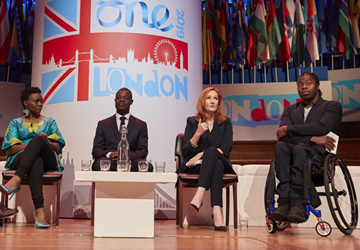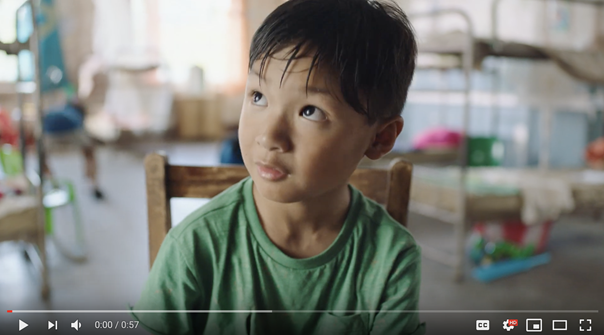
Helping Not Helping: A Charity Campaign to Drive a Difficult Conversation
by Rebecca Roberts
July 29, 2020
A finalist in the CIPR 2020 Excellence Awards, the Helping Not Helping Campaign is an example of a focused campaign that drives an uncomfortable and often complex discussion around voluntourism and western privilege.
Thread & Fable PR founder Rebecca Roberts explains all in this special case study blog for CIPR Not-for-Profit
The campaign challenge: ending the tourist attraction of children
The charity Lumos aims to end the institutionalisation (mainly orphanages and large care homes) of children around the world. Founded by author J.K Rowling, the charity works to support alternative solutions for children and their families, working on in-country change and solutions.
Admittedly, before working on this campaign I had no concept of the ‘issue’. As the advocacy and communications teams shared key information, reports and data, I was struck by how outrageous the scenario was. A staggering 80% of children in orphanages around the world have at least one living parent. Read that again.
Poverty and a lack of education, healthcare and community support are the main drivers for this statistic. Children are regularly recruited away from families in the promise of a better cared for life. Many families are torn apart. This darker side is only flourishing with well-meaning droves of western volunteers. Orphanages attract aid, trips, volunteers and donations.
THE BRIEF
A chance to launch a youth-facing campaign at the One Young World summit, which would be held in London for its 10th anniversary in October 2019 had arisen, and the charity had just a few months to use the opportunity to drive the conversation about voluntourism as well as affect actual change.
The campaign was focused on:
-
Strengthening the global evidence base on orphanage tourism, specifically youth attitudes.
-
Shift young people away from the social norms of volunteering, visiting and donating to orphanages towards other ethical options.
-
Influence policy and practice of governments, institutions and business.
Having delivered youth marketing workshops and shared my
Engaging Youth report as part of my own consultancy Thread & Fable, I was brought in to help establish and project manage the campaign ready for launch, working alongside Lumos’s marketing and communications and advocacy teams.
Understanding our audience
We knew from various reports that the issue of voluntourism and orphanages wasn’t high on the agenda for the general public and there was little data specifically on our target audience of university students. To get more insight and ensure the campaign was positioned correctly we undertook:
- Workshops and meetings within the sector to engage key groups.
- Desk research of existing campaigns tackling voluntourism.
- YouGov survey to 1000 UK 18-24s in full-time education.
- Youth focus group feedback at each stage of campaign development.
From this our audiences and calls to action included:
- 18-24s in full time education in the UK: to make informed decisions on their volunteering and travel trips.
- The UK Higher Education sector: to support the campaign and make steps to update volunteering policies.
- The Commonwealth and UK Foreign Office: to change the travel advice for the UK.
- Volunteering and Travel Sectors: to update their policies and join the conversation.
- Corporate Sector: to update existing or develop new policies in relation to their Corporate Social Responsibility (CSR), volunteering or charities supported.
Campaign Development
Creative agency WTF established #HelpingNotHelping, a play on ‘sorry not sorry’, to subtly challenge what we think we know about orphanages and volunteering and visiting them. For launch, a media pack of assets, microsite and campaign film were needed. Darling Films created the concept of an orphanage ‘experience’ shot from the perspective of the child.
You can
see the campaign film here and
microsite here.

Key outcomes
The campaign launch was a huge success. The charity’s founder, along with television presenter Ade Adepitan, two self-advocates who had grown up in orphanages, and the charity’s Deputy Chief Executive Officer launched the campaign on stage at One Young World. It was powerful.
Most importantly, however, was the momentum of the campaign in driving advocacy conversations leading up to and throughout the first few months of the campaign. Key outcomes included:
● The Commonwealth and UK Foreign Office has changed its travel advice for the UK.
● Partner organisations: Over 150 stakeholders, such as the National Union of Students, Voluntary Services Overseas and Raleigh International, shared the campaign at launch.
● Our impression target was 1m, which we doubled on Twitter alone, reaching over 2m.
● Engagement surpassed the charity’s normally at 14.2% and we increased following by over 5,000 across channels and over 54k views around launch on YouTube (on Lumos and One Young World channels).
● international media from launch with an estimated reach of 18.1m.
● Our microsite peaked at 1800 views at launch, with an average daily of around 40.
● Built a conversation around #HelpingNotHelping being used and linked to orphanages.
● Had contact with every UK University, with three adopting the policy around launch and many more working on it since. Many businesses have also changed their policies.
● Generated support within the wider care reform and anti-trafficking sectors as well as other advocacy departments, such as meeting with the Ministry of Defence, and the McCain Institute being shown the campaign.
● Lumos has also run successful donor events discussing the issue and sharing the campaign.
What we learned…
● Audience data is key: use data to understand how much your audience know about the issue you’re talking about. Often, internally, you’ll become blind to how much a wider/different audience knows or connects with your issue.
● Context is everything: the wider issue the charity wants to solve is huge and complex. We needed to work hard to define what this campaign could help with along that journey and how it could then be used to define changes as the campaign targets other regions.
● Difficult conversations are challenging to unpack: we soon understood that overloading our audience with the full picture wasn’t going to work in driving the conversation. We needed to break it down and find a relatable hook to generate discussion and peak interest of key audience groups.
● Values often resonate more than the issue: for many, the issue of orphanage voluntourism isn’t something that impacts their day-to-day life. Being altruistic and enjoying ethical travel experiences and fairness are. So, positioning this unequal exchange of the child and the visitor was easier to understand and became more relatable.
____
Rebecca Roberts is founder of Thread & Fable PR.